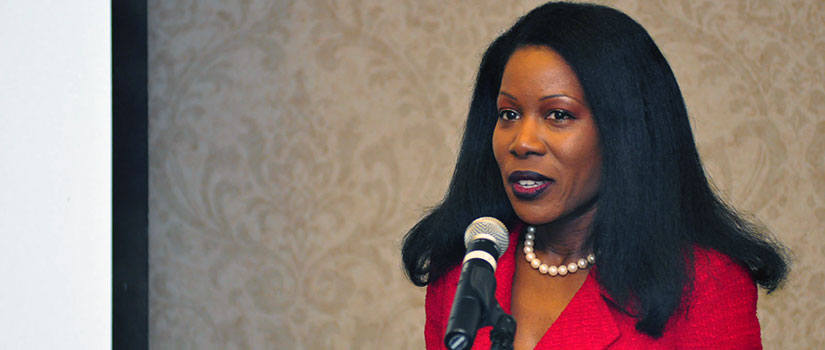To help her understand the “great migration,” Isabel Wilkerson retraced her own parents’ steps and experiences to write about the millions of African Americans who relocated during the early 1900s. By traveling the same long routes from the South, she could better understand their journey to freedom.
Wilkerson, the first African-American female to win a Pulitzer Prize, said the societal
and economic struggles of the migration were an inspiration. “If they could do it,
we as a nation can do anything, no matter what obstacles we face."
She was the keynote speaker in this year’s 36th annual AEJMC Southeast Colloquium
in March. She spoke on the 15-year venture of writing the award-winning The Warmth
of Other Suns: The Epic Story of America’s Great Migration, a story centered on three
African-Americans who left the south in hopes of a better life in the north, east
and west.
More than 120 scholars attended this year’s Colloquium, the fourth time the School of Journalism and Mass Communications has hosted it. The J-school also launched the first Media and Civil Rights History Symposium, which ran concurrently with the Colloquium. The symposium brought together more than 50 history, journalism and English scholars from all across the United States and two other countries to discuss current journalism and historical trends.
The two events shed light on the connection between journalism and history. Wilkerson, a journalist and professor at Boston University, was an icon for the weekend because she bridged the gap between media and civil rights by speaking at the joint luncheon.“By hosting both of these events, we’re hoping to raise our profile in the research community in the disciplines of journalism and mass communications. We have a wonderful doctoral program. We have great professors producing research. This is a way for us to highlight the very good work that is done here at South Carolina,” said Dr. Kathy Forde, conference organizer and associate professor in the J-school.
Sid Bedingfield, a USC visiting professor, received the Top Faculty Paper recognition at the Colloquium. “I have always been fascinated by the role newspapers and other media play in helping shape our political life,” Bedingfield said. “In this article, I looked at how one newspaper — the News and Courier of Charleston — combined journalism and political activism to help foster the rise of the modern conservative movement in South Carolina.”
The more than 50 scholars participating in the Media and Civil Rights Symposium, saw a screening of Freedom Writers: An American Experience. The PBS documentary tracks the history of the segregation movement at its peak in the Deep South. Nothing would ever be the same after the Freedom Riders’ plan to simultaneously put blacks and whites on commercial buses. Although they faced years of adversity, ranging from harsh beatings with iron pipes to violent crimes, the activists carried on.
A highlight of the symposium was the presentation of the inaugural Farrar Media and Civil Rights History Award to USC alumnus Dr. Gordon Mantler of Duke University’s Thompson Writing Program. The award is named for Dr. Ronald Farrar, distinguished professor emeritus, and the late Gayla Farrar. “The award came as a total surprise” said Dr. Farrar who wished his wife could have been there to congratulate Dr. Mantler. Dr. Farrar taught Dr. Mantler in his undergraduate studies. Dr. Mantler said, “Professor Farrar was always fair, thoughtful and engaged, with a good sense of humor to boot—the model of the professor I strive to be now.”
As he delivered the Farrar Lecture at the Symposium, Dr. Mantler read from his paper “The Press Did You In: The Poor People’s Campaign and the Mass Media.” The article, published in the spring 2010 issue of The Sixties: A Journal of History, Politics, and Culture tells the story of how the Poor People’s Campaign helped not just poor African Americans in the 1960s, but all poor people to successfully prove to the government their need for adequate housing and a livable annual income.
More than 15 J-school faculty and students presented their research and moderated sessions at the Colloquium and Symposium.
